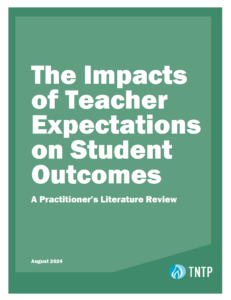Last week brought the latest chapter of the Common Core saga in New York, which we’ve been chronicling for more than two years on this blog. It was a disappointing one for those of us who support high standards that will help prepare students for college—a goal that, according to polls, an overwhelming majority of parents have for their children.
Here’s a quick refresher: Governor Andrew Cuomo—the self-appointed “lobbyist for the students”—has spent much of the last four years fending off efforts by special interest groups to gin up hysteria about Common Core and the associated annual tests. The criticism reached such heights this year that Cuomo appointed a task force to make recommendations about how the state could implement the standards more effectively.
The task force released its report last week. It reads much more like a greatest hits list of complaints from the most vocal Common Core critics than a serious effort to help New York’s schools. As Robert Pondiscio noted in a searing New York Daily News op-ed over the weekend, many of the recommendations would take the state back to the “bad old days of low standards.”
I was most disturbed by two recommendations that would hurt our most vulnerable students. First is the idea that the state should lower expectations for disabled students and English Language Learners in the name of “flexibility.” There’s a reason the federal government has rejected this kind of lowest-common-denominator thinking in the past: it’s too easy for schools to write off these students as too hard to teach, which would only exacerbate the huge achievement gaps they already face.
Similarly, the task force says that standards in kindergarten through second grade—critical years that can make or break a child’s academic future—should be dumbed down because they are “too challenging,” despite the fact that thousands of students are already meeting them.
The task force makes these and other misguided recommendations based only on a handful of anecdotes, not any hard data or research. A typical example: the report claims that Common Core “diminish[es] a love of reading and the joy of learning.” The evidence for this sweeping indictment? Apparently, “concerns have been expressed”—by unknown parties—“regarding the emphasis on non-fiction at the expense of literature.” I’m all for gathering feedback from parents and teachers to help improve academic standards (or any other policy). But making sweeping changes that would affect millions of kids based on the concerns of a handful of people isn’t a smart way to run an education system.
A few other thoughts about the task force’s report and what happens next:
- The report recommends spending untold millions of dollars on more professional development for teachers. Teachers definitely deserve better support that helps them adjust to higher academic standards. The problem is that the task force seems to have no clear vision of what exactly all this new PD will help teachers do, or how much it will help them improve. One of the biggest lessons from our recent study about teacher improvement is that PD efforts that aren’t tied to clear goals for teacher improvement are more likely to be a waste of money than actually be helpful to teachers.
- The task force would also eliminate measures of students’ academic progress based on state tests from teacher evaluations until at least 2020—in other words, go back to the days when teachers don’t even bear a measure of accountability for how much they help their students learn. This was at the heart of the state teachers’ union’s campaign against testing, and we don’t have to guess about what the result will be. Evaluations that ignore student learning inevitably rate almost all teachers good or great, regardless of their actual performance. Governor Cuomo was right to mock these sorts of results as “not real,” just as he was right to push for evaluations that give teachers more meaningful feedback and school systems with better information on teachers’ performance.
That the task force went such a disheartening direction wasn’t surprising given the current political climate in New York. What was surprising is that Cuomo came out strongly in support of recommendations that would reverse the teacher evaluation changes and many of the other policies he spent huge amounts of political capital (not to mention a lot of taxpayer money) to implement.
But here’s the good news: Cuomo has the final say on which recommendations to accept. He could still push back on some of the task force’s worst ideas. He could show other governors that they don’t have to be pressured into using their newfound flexibility under ESSA to soften school accountability instead of ensuring it is based on real student progress (and you can bet that interest groups are gearing up to apply that pressure even as you’re reading this). He could hold the line on high standards for students and fair, meaningful accountability for teachers, even as he looks for ways to bring more voices into the process.
He’s done it before. Let’s hope he summons the will to do it again.








